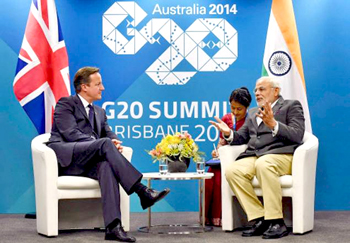 Brisbane, Nov 15: Prime Minister Narendra Modi on Saturday unequivocally said that repatriation of black money kept abroad is a "priority" for his government, as he sought close global coordination to achieve this objective.
Brisbane, Nov 15: Prime Minister Narendra Modi on Saturday unequivocally said that repatriation of black money kept abroad is a "priority" for his government, as he sought close global coordination to achieve this objective.
Raising the black money issue at an informal meeting of leaders of the five-nation BRICS bloc, Modi set the tone on this key issue ahead of the G20 summit in the wake of his commitment to bring back every penny of black money stashed abroad.
"Repatriation of black money kept abroad is a key priority for us," Modi told the BRICS leaders.
Calling for close coordination on the issue of black money kept abroad, Modi also said this unaccounted money is also linked to security challenges.
As India makes attempts to retrieve the black money, the Prime Minister has already made it clear that close cooperation to retrieve the black money from abroad is a key issue for him.
The G20 host Australia yesterday vowed a "very aggressive" crackdown on tax avoidance. India is also seeking strong action by the G20 industrialized and emerging economies against tax havens.
"A key issue for me would be to highlight the importance of international cooperation against black money," Modi had said, as he is set to renew the country's commitment at the G20 summit to a global response to deal with cross border tax avoidance and evasion.
India is also expected to urge the G20 to pressure tax havens into revealing more information on black money from India to help retrieve this illegal money.
Besides Modi, Chinese President Xi Jinping, Russian President Vladimir Putin, South African President Jacob Zuma and Brazilian President Dilma Rousseff, were the other leaders who took part in the informal interaction.





Comments
Add new comment